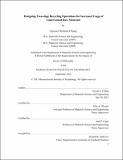| dc.contributor.advisor | Elsa A. Olivetti and Joel P. Clark. | en_US |
| dc.contributor.author | Chang, Jiyoun Christina | en_US |
| dc.contributor.other | Massachusetts Institute of Technology. Department of Materials Science and Engineering. | en_US |
| dc.date.accessioned | 2016-03-25T13:26:01Z | |
| dc.date.available | 2016-03-25T13:26:01Z | |
| dc.date.copyright | 2015 | en_US |
| dc.date.issued | 2015 | en_US |
| dc.identifier.uri | http://hdl.handle.net/1721.1/101795 | |
| dc.description | Thesis: Ph. D., Massachusetts Institute of Technology, Department of Materials Science and Engineering, 2015. | en_US |
| dc.description | This electronic version was submitted by the student author. The certified thesis is available in the Institute Archives and Special Collections. | en_US |
| dc.description | Cataloged from student-submitted PDF version of thesis. | en_US |
| dc.description | Includes bibliographical references (pages 126-130). | en_US |
| dc.description.abstract | Recycling provides a key strategy to move towards a more sustainable society by partially mitigating the impact of fast-growing material consumption. Recent advances in reprocessing technologies enable recyclers to incorporate low-quality secondary materials into higher quality finished products. Despite technological development, the use of these materials in the re-melting stage to produce final alloys is still limited. This thesis addresses this issue by raising the following question: given the complexity of the reprocessing operational environment, what is the most effective way to manage two-stage recycling operations to maximize the usage of low-quality secondary materials? This thesis answers this question for two systems: when outputs from the reprocessing stage can be delivered (1) as sows and (2) as liquid metals to the re-melting stage. In the first system, the main barrier to use of these materials is the highly variable quality of raw materials. This study suggests the use of data mining as a strategy to manage raw materials with uncertain quality using existing data from the recycling industry. A clustering analysis provides criteria for grouping raw materials by recognizing the pattern of varied compositions. This grouping (binning) strategy using the clustering analysis increases the homogeneity and distinctiveness of uncertain raw materials, allowing recyclers to increase their usage while maintaining minimum information about them. In the second system, significant energy cost can be saved by immediately incorporating reprocessed secondary raw materials as liquid metal into final alloy production. In this case, the coordination between the reprocessing stage and the re-melting stage is critical. This study suggests integrated production planning for two stages. The mathematical pooling problem is used to model two-stage recycling operations. Integrated planning across the two operations can adjust batch plans and design intermediate products by reflecting demand information of final products. This approach maximizes the use of intermediate products as liquid in the remelting stage and, therefore, lowers energy cost significantly. Both strategies are applied to industrial cases of aluminum recycling to explore the benefits and limitations. The results indicate the potential opportunity to significantly reduce material costs and to increase the use of undervalued secondary raw materials. | en_US |
| dc.description.statementofresponsibility | by Jiyoun Christina Chang. | en_US |
| dc.format.extent | 134 pages | en_US |
| dc.language.iso | eng | en_US |
| dc.publisher | Massachusetts Institute of Technology | en_US |
| dc.rights | M.I.T. theses are protected by copyright. They may be viewed from this source for any purpose, but reproduction or distribution in any format is prohibited without written permission. See provided URL for inquiries about permission. | en_US |
| dc.rights.uri | http://dspace.mit.edu/handle/1721.1/7582 | en_US |
| dc.subject | Materials Science and Engineering. | en_US |
| dc.title | Designing two-stage recycling operations for increased usage of undervalued raw materials | en_US |
| dc.title.alternative | Designing 2-stage recycling operations for increased usage of undervalued raw materials | en_US |
| dc.type | Thesis | en_US |
| dc.description.degree | Ph. D. | en_US |
| dc.contributor.department | Massachusetts Institute of Technology. Department of Materials Science and Engineering | |
| dc.identifier.oclc | 944023166 | en_US |
